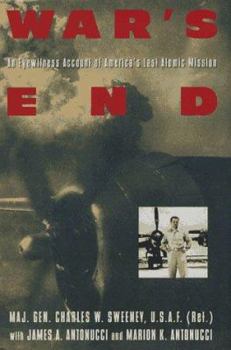War's End: An Eyewitness Account of America's Last Atomic Mission
Select Format
Select Condition 
Book Overview
On August 9, 1945, on the tiny island of Tinian in the South Pacific, a twenty-five-year-old American Army Air Corps Major named Charles W. Sweeney climbed aboard a B-29 Superfortress, in command of... This description may be from another edition of this product.
Format:Hardcover
Language:English
ISBN:0380973499
ISBN13:9780380973491
Release Date:January 1997
Publisher:William Morrow & Company
Length:290 Pages
Weight:1.10 lbs.
Dimensions:1.1" x 5.8" x 8.6"
Customer Reviews
5 ratings
A fasinating account on the B-29 and the bomb
Published by Thriftbooks.com User , 21 years ago
I found that Sweeney book on the development of the B-29 and the dropping of the atomic bomb to being very interesting.Although I have read much on the atomic bomb, I never realised the particular problems faced by the people who actually dropped it. If you are interested in this subject this book is a must.
Finally a first-person account and it's fabulous!
Published by Thriftbooks.com User , 25 years ago
Every high school history teacher should make this book required reading! General Sweeney spins a wonderful, non-technical, and honest tale of the real end to war in the Pacific. Those generational second-guessers who think we didn't need atomic weapons to end the war should be ashamed of themselves.
Unvarnished personal account of both atomic missions.
Published by Thriftbooks.com User , 25 years ago
General Sweeney defends the use of the atomic bombs in World War II without being defensive. As the only individual to actively participate in both missions which ended the war, Sweeney brings a unique perspective to this now controverisal issue. First, he presents his story in a refreshingly plain style, then gives the reasons why it all happened. Sweeney's voice is the calm in a storm of revisionist histories and thus carries the most weight. This is a personal story more than objective history, but it contains something other studies lack: a true sense of context, and that makes it a story worth reading.
"War's End" captures a time when patriotism was the norm
Published by Thriftbooks.com User , 27 years ago
The wartime world that Charles W. Sweeney evokes so eloquently in "War's End" is one that is almost incomprehensible to anyone under fifty. How can anybody grasp concepts such as "total war," "total mobilizaton," the sky filled with thousands of bombers and American deaths numbering 900 a day? But even harder to understand in a modern society where sacrifice can mean giving your subway seat to an old lady is how young men in their twenties can routinely put their lives on the line for such abstractions as "country," "duty"...and simply doing the right thing. This is one of the messages that Sweeney brings home so forcefully in his book people united in a monumental effort to defeat a fanatical enemy. We should all thank the General...for what he did during the war and for the way he has been able to debunk the revisionists and preserve this grand story for later generations. As someone born under Japanese occupation in the Philippines, I have to add my personal "Thank you." We're very, very grateful.
*Starred* review from Publishers Weekly (July 7, 1997):
Published by Thriftbooks.com User , 27 years ago
Sweeney begins this riveting chronicle by reminiscing about his childhood days, when school officials would drag in "some poor old guys" to talk about what they had done during the Spanish-American War. "Now I'm the old guy doing the telling," Sweeney says--and what a story he has to tell. As a 25-year old Army Air Corps captain, Sweeney was the only pilot to fly on both U.S. atomic missions against Japan, over Hiroshima and Nagasaki. Here, he does a fine job of capturing the spirited atmosphere of life on a wartime flight line. Writing with a wit that is sometimes lacking in military memoirs, he presents the dramatic events surrounding the development of the awesomely powered B-29 bomber, which would eventually deliver the weapons. His portrayal of legendary general Curtis LeMay, who would later become Air Force chief of staff, is masterful. The bombing missions themselves are relayed with tension and drama, including the startling revelation that the men delivering the first bomb did not know if they would be able to fly clear of the explosion. Emphasizing that he hopes that such destructive weapons are never again deployed, Sweeney argues forcefully that the decision to use the weapons against Japan was the correct one. This memoir should be required reading for all students of World War II. (Copyright 1997 by Publishers Weekly)





